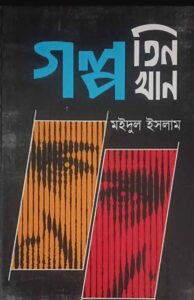
Political Theory and South Asian Counter-Narratives

গল্প তিনখান


Limits of Islamism
Jamaat-e-Islami in contemporary India & Bangladesh
Reviews
[T]his work is a useful addition to the growing body of literature that seeks to understand Islam and Islamism in the contemporary world. —Journal of the Commonwealth Lawyers’ Association
The Jamaat-e-Islami Hind and Bangladesh Jamaat-e-Islami cannot be treated as a single organisation. This study is in reality a comparative study of the ideological articulation of the two organisations … On this score, Maidul Islam has succeeded well. —The Muslim World Book Review
[T]he book provides a comprehensive review of some of the headline-catching debates about socio-politico-economic issues and locates Jamaat-e-Islami in the changing scenario of neo-liberal economy in India and Bangladesh. It offers a wealth of information on continuities and ruptures of Islamism and argues, quite persuasively, their response to neo-liberalism. … [It] is a welcoming addition in the literature of Islamism in South Asia. It will be useful to the policymakers as well as scholars having particular interest in this area of research. —India Quarterly
[T]his book has successfully extended the debate on Islam, Muslims in general and radical Islam particularly in South Asia. —The Book Review
Maidul Islam raises a compelling question – how can we explain the existence of religious ideologies in our modern and scientific world? … Maidul also provides an engrossing narrative about Islamists’ reaction to ‘Western cultural globalization’ … Overall, this book would be helpful to anyone studying Islamist politics and radical Islamic terrorism since Maidul provides a thoughtful analysis of an under-researched region. Scholars of the region would also benefit from Maidul’s contribution. —Asian Politics & Policy
Maidul Islam’s strength lies in the case studies he conducts in India and Bangladesh … The interlinking of history with the ideology and the different lines of approach of the Jamaat in the two countries adds a special dimension to the book. The facts about the Jamaat’s electoral performances are informative. The comparison between the Jamaat on the Indian soil and its counterpart in Bangladesh shows the amount of hard work that must have been undertaken in order to arrive at a conclusion. His conclusion about the contrasting responses of the Jamaat in the two countries is worth noting. —The Telegraph, Kolkata
Indian Muslim(s)
after Liberalization
Reviews
Maidul Islam presents a serious analysis of the Muslim predicament in the era of economic liberalisation. He gives a good overview of literature and sheds light on the contemporary debates on Muslim politics. —The Hindu
The book is indeed provocative in multiple senses. First, the author engages himself to explore the problems of the Muslim minorities and their identity formations in liberal-cum-neo-liberal India. Second, in order to unravel the complexity of identity, the author explores the theoretical possibility of investigating Muslims from the location of socio-economic and political marginalization of group identity. This is a feat in itself as such analytical framework was unthinkable three decades ago. Third, the book is a serious attempt to understand Muslim questions in terms of their democratic rights as citizens of India…Above all, the book is an important intellectual exercise to understand Muslim problems in a progressive theoretical context. —The Book Review
Well-researched publications since the Sachar Committee Report, 2006 are few and far between. The Sachar report brought together authentic empirical data on Muslims—the largest of the Indian minorities—and wrote analytical perspectives on social, educational, and economic levels in comparison to other socio-religious communities (SRCs). Indian Muslim(s) after Liberalization by Maidul Islam, therefore, is a welcome addition. It is topical and relevant to the contemporary social and economic growth discourses of India..this book highlights multiple concepts and issues on the status of the Muslim community in India and makes the reader think. –Economic and Political Weekly
The Indian Muslim has been an eternal subject of coverage in the country’s English and regional media, for all kinds of reasons… ‘Indian Muslim(s) after Liberalization’ authored by Maidul Islam, a political science faculty at the Centre for Studies in Social Sciences, Kolkata takes a scholarly look at the community’s lives and times. —The Hans India



